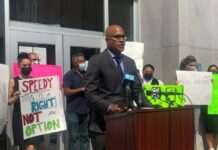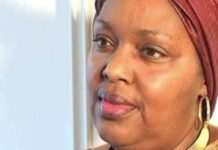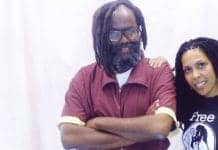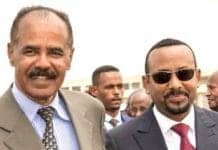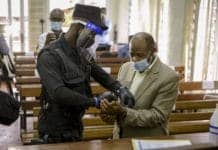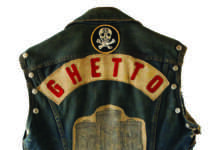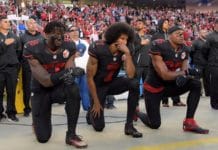by Ann Garrison
On New Year’s Eve, the people of the Democratic Republic of the Congo (DRC) went to the polls to choose their next president, parliament and provincial governments. I spoke to Maurice Carney, executive director of Washington, D.C.-based Friends of the Congo, about the results.
Ann Garrison: Shortly after the New Year’s Eve polls in the Democratic Republic of the Congo (DRC), you created the petition, “Respect the People’s Voice and Count Their Votes.” Over 2,000 people signed before you updated it with the headline “Constitutional Court Proclaims Felix Tshisekedi President of DRC,” and Félix Tshisekedi has since been inaugurated. Do you believe that all the people’s votes were counted and that Tshisekedi was rightly elected?
Maurice Carney: No, and it is not only that not all the people’s votes were counted, but also that not all the people were able to vote. Over 1.2 million people in opposition strongholds Beni, Butembo and Yumbi were disenfranchised. They were not permitted to vote because of the Electoral Commission’s baseless claims that poll workers would be insecure there and would also face the risk of contracting Ebola.
As for the rest of the nation, we do not know what the final results were because the National Electoral Commission has not published their results. They announced the winners in both the presidential and parliamentary elections, but they have not published detailed results from each polling station as DRC’s electoral law requires, and we don’t believe they will publish those results.
AG: DRC’s Catholic Church was the principal dissenter about the election results. I have been told that the church is the second most powerful institution in DRC, second only to the army, and the most respected. When President Joseph Kabila postponed the December 2016 election, his police brutally beat and even kidnapped Catholic clergy for protesting. Kabila had, of course, clung to power for 18 years, but finally stepped down – at least formally – after this election.
Am I understanding this? And what else should we know about the role that the Catholic Church played in this election?
MC: Congo’s National Episcopal Conference (CENCO) dispatched 40,000 observers throughout the country during the elections, and their results fundamentally differed from those reported by the Electoral Commission. I’m not certain whether the Catholic Church is the second most powerful institution in the country, but they are certainly one of the best organized and most respected.
Intellectuals and grassroots activists also organized in a formation called the Lay Coordinating Committee. They put enormous pressure on the Kabila regime in a series of demonstrations from the end of 2017 to the start of 2018.
Remember, it was the CENCO who stepped in to mediate between the Kabila regime and the opposition at the end of 2016 when Kabila failed to organize elections. Friends of the Congo was critical of the consequent Saint-Sylvestre Agreement, but it did ease tensions and ward off more lethal clashes between the Kabila regime and the Congolese people.
However, the central part of the deal was that Kabila would organize elections and step down within one year – by the end of 2017, and he didn’t do so. He also trashed other elements of the deal, spurring the faith leaders into action to put street pressure on Kabila. The response from the Kabila regime was brutal; his security forces tear-gassed protestors, killed dozens of them, and fired live bullets into churches. Priests and youth were beaten and jailed, and it was during these demonstrations that Kabila’s security forces assassinated the young activist Rossy Mukendi.
AG: Can you describe the church’s election observation mission, which led them to disagree with the National Electoral Commission’s conclusions?
MC: The church was not present in all 70,000-plus polling stations, but they covered a statistically significant part of the electorate, and their observers were well trained. The church has played this role as observer and civic educator for all of the recent elections (2006, 2011 and 2018) and the vote for the new Constitution dating from 2005.
So this role of holding politicians and the Electoral Commission accountable is not new for DRC’s Catholic Church, but this year it was more aggressive about sharing its findings with the media, especially in advance of the Electoral Commission’s announcement, which everyone expected to be biased in favor of the Kabila regime.
AG: The National Electoral Commission’s proper name is the Independent National Electoral Commission (CENI), which is supposed to mean it’s independent of the government. Do you believe it is?
MC: Not at all. No one believes it is independent. It is anything but independent; the Kabila regime has fully instrumentalized the CENI to do its bidding. It is not by accident that virtually all the decisions it made – from disenfranchising over 1.2 million voters to changing the date of the elections from December 23 to December 30 – worked against the opposition and in favor of the regime.
I am hard-pressed to find one decision that the CENI has made that Kabila’s ruling coalition did not agree with. They were the only ones who signed on to the CENI’s “code of conduct.” The opposition did not sign because the CENI refused to include measures that would add to the transparency and accountability of the electoral process. Mind you these measures that the opposition called for are codified in DRC’s electoral law. They include posting of the voting results at each polling station, but that wasn’t done.
AG: And what about DRC’s Constitutional Court, which affirmed the CENI’s conclusion that Tshisekedi won? Is it independent of the government?
MC: Not at all. It too is far from independent. I am hard-pressed to see any situation where the Constitutional Court in its current configuration would have ruled against the Kabila regime.
Months before the elections, Kabila appointed handpicked allies to the court to tilt it in his favor. It was already a biased court that had ruled in his favor even in violation of its own rules and guidelines. Going into these elections, the Kabila regime was in firm control of the CENI, the Constitutional Court and the security forces, which it used against the opposition, particularly Martin Fayulu and his Lamuka coalition, several times.
AG: Did the church name the candidate they believed to have won the election or simply say that their results differed from the CENI’s?
MC: The name was leaked to diplomats and the media. The New York Times ran an article claiming that the church said the winner was Fayulu. However, the church denied that it named the winning candidate. According to analysis by the Financial Times and a number of other Western media outlets, leaked data from the CENI combined with results from the CENCO demonstrated that Fayulu was the winner by far.
AG: Who do you believe won the election, or do you want to say?
MC: The issue is not who we believe won the election. The question is, did the CENI follow the electoral law? Did the CENI count the votes? Did the CENI publish the results per the electoral law? And the answer to all of these questions is a resounding no.
So where did the CENI get its results from? The answer is clear; the results that the CENI announced at the presidential, parliamentary and provincial levels were manufactured to protect the interests of the Kabila regime despite the population’s heightened vigilance and readiness to fill the streets across the country to demand the change that the population voted for.
AG: Last week I wrote an essay for the Bay View headlined “Anti-imperialist Dilemma: What If the US Is ‘Right’ About the Election in DR Congo?” which turned out to be the most regrettable headline I’ve written yet, because the U.S. reversed its position and recognized Tshisekedi as DRC’s new president a day later. On Jan. 10, the State Department had called for a peaceful resolution of challenges to the results, and the day I wrote that piece, Maryland Congressman Chris Smith – former chairman of the House Foreign Relations Subcommittee on Africa – had posted a press release on his website threatening “visa denials, sanctions and other tools against those complicit in election fraud.” So I didn’t expect the story to change that fast.
The U.S. isn’t in the habit of respecting other nations’ existing institutions, most notably right now in Venezuela, so why do you think it ultimately chose to respect the conclusions of DRC’s corrupt CENI and Constitutional Court?
MC: We have to always remember that the U.S. is an empire. It seeks to fully dominate the globe and do so in perpetuity. Therefore, when you make an analysis from the perspective of whether the U.S. is right or not you are already wading into troubled waters.
We have always maintained that we have to make an analysis from the point of view of the oppressed masses of Congolese – these are the people we work with on a daily basis. These are the people we are in solidarity with. So our consistent refrain has been that the people’s votes and voices be respected.
If the U.S. agrees with that position for a nanosecond, then fine, we know that the U.S. government has no concern for democracy, human rights or the people’s will – they may have agreed with that position at that moment because they felt it served their interests at that moment. But we are clear that the United States has never been on the side of the Congolese people in particular or Africans in general, especially when it comes to questions of democracy, human rights and self-determination.
In order to believe that the U.S. is right about democracy and the people’s will in the Congo, you would have to ignore an entire half-century of history. It was the United States that destroyed whatever hopes the Congolese people had of a democratic future when the CIA led the overthrow of Congo’s first democratically elected prime minister, Patrice Emery Lumumba. The United States overthrew Lumumba and dismantled DRC’s fledgling democracy.
It then installed and maintained a brutal dictatorship for over three decades. When the Congolese people finally resuscitated a pro-democracy movement to resist dictatorship, the U.S. crushed it again. Instead of supporting democracy, it backed an invasion of DRC – which was then Zaire – by U.S. client states Rwanda and Uganda. That invasion triggered the deadliest conflict in the world since World War II in which an estimated 6 million Congolese perished. So no, we may be off point on many things or confused about some, but we will never be confused about whether the U.S. supports the Congolese people and democracy in the heart of Africa, never.
AG: During the first week of January, the Pentagon dispatched 80 heavily armed combat troops with air support to Gabon, on the West African coast, and said they were prepared to cross borders into DRC, if needed, to protect U.S. citizens and property from widespread election violence. There’s been no widespread violence, and the U.S. didn’t invade, so what do you think that was all about?
MC: We do believe the U.S. was ready to intervene militarily in the Congo to protect its interests, but this has nothing to do with the Congolese people or democracy. The moment provided an opportunity for the U.S. to flex militarily and it did; this is what empires do. They use instruments that suit their interests, whether it be soft power via USAID, NDI, NED etc. or hard power via its military, and the DRC situation met the threshold according to their calculation to dispatch troops.
As people of conscience, we have to stand against the U.S. militarization of DRC, Africa and the globe for that matter. So whether it’s 80 troops in Gabon or a proposed 5,000 troops in Colombia, ostensibly to commit regime change in Venezuela, we have to raise our voices and say no and call on our elected officials and media outlets to say no to U.S. militarization and regime change around the globe.

AG: Most of the Congolese I have consulted agree that the Kabila government was deeply corrupt and that it struck a deal with Félix Tshisekedi once it saw that it couldn’t steal the election for its own candidate, Emmanuel Shadary, because he had so little support. And that, in his 18 years in power, Kabila and his cronies robbed the people of their resources, committed massacres, and failed to build the communications and transportation infrastructure required for a modern domestic economy. Do you agree?
MC: Yes!
AG: Is it nevertheless a victory that DRC has finally seen a peaceful transition of power after 60 years of U.S. and European proxy assassinations and wars to control DRC and its resources?
MC: It is in small part a milestone for the people. Kabila did not want to go, and the people organized to force him to go. Kabila did not want to organize elections, and the people organized to force him to hold elections. Kabila wanted to run for a third term, but the people organized to force him to stand down. Kabila wanted to impose his chosen candidate, Emmanuel Ramazani Shadary, on the people, but the people resisted by voting in massive numbers to reject Shadary and made it impossible for the CENI to declare Shadary the winner. So these are the victories that the people can and should claim from the past two years.
However, the deal that many believe that Kabila struck with Tshisekedi gave the Kabila regime a lifeline. The people mobilized for change but Kabila’s coalition still controls some 337 of 500 seats in Parliament and 22 of 26 provinces. This is not the change that the people voted for. The people had Kabila on the ropes, and he was rescued by one of the opposition candidates – Tshisekedi – which means that the people have to redouble their efforts and fully clean house. This will require continued organizing and mobilizing to assure that the system is dismantled, not just that one leader replaces another. The people want systemic change, and they will not be deterred.
AG: A number of people wrote to me to object to my last essay and particularly the headline “Anti-imperialist Dilemma: What If the U.S. Is ‘Right’ About the Election in DR Congo?” “Right” was meant to indicate that U.S. foreign policy is never based on principle, but that it might occasionally – very occasionally – happen to coincide with the will of the people. (In this case, until the day after my piece was published.)
I had meant that in response to people who were then angrily, and understandably, insisting that if the U.S. favored Fayulu, they were against him. Eminent Congolese author Patrick Mbeko had written that there are always fierce imperial motivations at work in DRC because of its vast geostrategic resources, but that honoring the Congolese people’s electoral choice was most important, no matter what the U.S. or any other imperial powers said or did.
In my responses to readers’ objections to that piece, I’m going to, at least in part, defer to you.
MC: It may be a cliché, but a broken clock is right twice a day.
AG: You’ve said that “the Kabila machine” remains in control, even though Tshisekedi is now president. I imagine that by “the Kabila machine” you mean something like the Congolese deep state, and I think we all know that no presidential election alone ever does away with that. Do you see grassroots movements with transformational potential, and if so, do you think Tshisekedi will give them some space?
MC: The Kabila machine is not as mysterious as the “deep state.” Kabila’s coalition, the Common Front for the Congo, which he heads, controls a super-majority in the National Assembly, the lower chamber of DRC’s Parliament. They control 22 of 26 provincial assemblies which will be responsible for voting for the members of the other chamber, the Senate.
So the Senate will undoubtedly be controlled by the Kabila coalition. There’s little doubt that it will get to nominate the prime minister and control the defense, interior and mines ministries. So this is the current predictable set-up, but let’s see how it all plays out.
Regarding political or civic space, the people will not rely on Tshisekedi to give them anything. They will take it whether Tshisekedi likes it or not. This is the lesson that the people are learning, particularly the youth. If they want more space, they have to take it.
They cannot leave it to politicians to decide their fate. Given the chance, politicians will sell the people out for their own personal interests. So the organizing, the political education and the vigilance continue until the people are liberated, and that doesn’t happen with one election. The working and oppressed class struggle rages on in the heart of the African continent.

AG: It’s only been a week since Tshisekedi’s inauguration, but do you have any comment on his performance so far? I know he promised to free all political prisoners and that would undoubtedly be a good thing if “political prisoners” is rightly defined. Do you believe that’s his actual intent and, if so, will he have the power?
MC: As you said, it has only been a week; a government has not even been installed yet. As for observers and analysts, they have to give it some time. Many variables are still outstanding – once all the pieces are in place (prime minister, parliament, governors etc.), we can then begin to make an assessment.
AG: Anything else you’d like to say?
MC: Yes. As Lumumba says from his grave, “We are not alone. Africa, Asia, free and liberated people from every corner of the world will always be found at the side of the Congolese.” Let us all keep the spirit of Lumumba alive, in solidarity with the Congolese and the sons and daughters of all Africa.
Ann Garrison is an independent journalist based in the San Francisco Bay Area. In 2014, she received the Victoire Ingabire Umuhoza Democracy and Peace Prize for her reporting on conflict in the African Great Lakes region. She can be reached at ann-at-anngarrison.com.

 Store
Store






